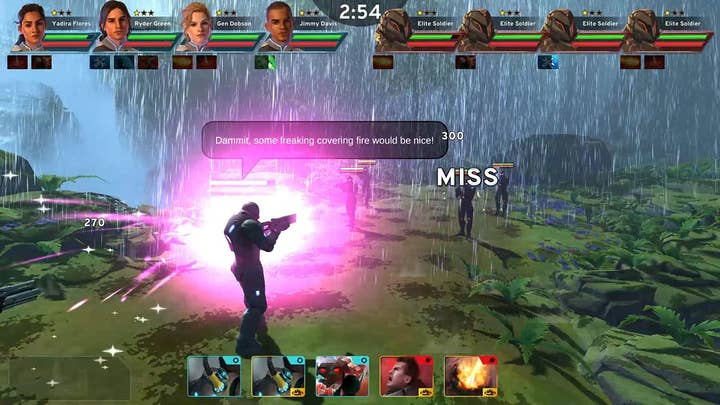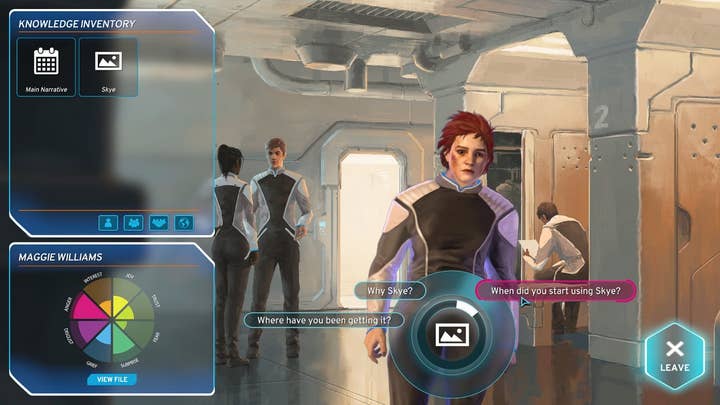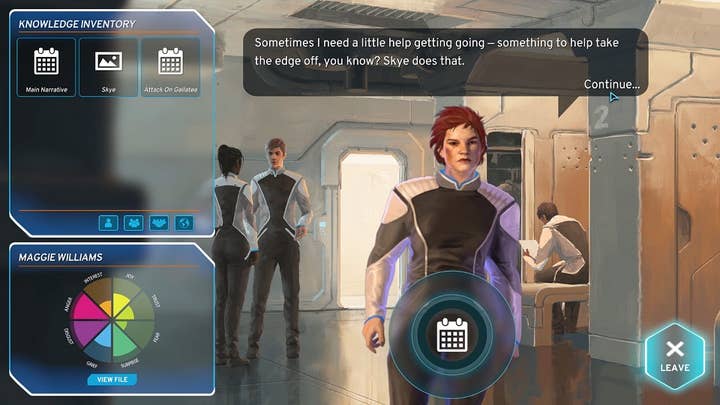Destiny's Sword presents a double-edged dilemma
2Dogs' Ken Hall talks about dealing with PTSD, anxiety, and addiction in a strategy MMO intended to be fun first and foremost
Ken Hall left the games industry in 2007. He had been art director at Realtime Worlds as the studio was working on the multiplayer online game APB: All Points Bulletin. Speaking with GamesIndustry.biz, Hall says that even though APB was originally planning on a pay-to-play subscription-based business model, he saw where MMOs and the industry in general were heading. When talk of switching APB to free-to-play monetization grew louder, he had some reservations.
"I was concerned because we were getting stats that the average Korean plays 37 hours a week of [online] games, and that's on top of a full-time job," Hall says. "It was very aggressive monetization in those days, and I wasn't very happy being part of that," adding that "It almost felt like being part of a drug-dealing operation."
Hall had previous experience in games -- for example, on the original PlayStation family-friendly title Rosco McQueen: Firefighter Extreme and B-17 Flying Fortress: The Mighty 8th -- but APB wound up as something he could be proud of in the same way.
"This really was a change for me to be at the pushier edge. I'm not ascribing intent to that; it was the early days of free-to-play and I think there was a lack of awareness of the impact of some of the decisions we made," Hall says. "Yes, you wanted people to stay logged in as much as possible, but nobody realized some of the health implications back then in the early 2000s, whereas nowadays we have a much better grasp of the implications of some of those design decisions."
Hall took a hiatus from gaming and returned to his native Ontario to create large-scale public artwork exploring social and ecological issues. It was creative and rewarding, but as the years went by, the idea of a return to gaming grew more appealing.
"I was working on my own all day every day, so I started talking to the walls," Hall said. "I'd gone from managing a team of like 100 people to suddenly being on my own, and I ultimately found that to be pretty isolating. I'm somebody who thrives off interaction and creativity where we can synergize build on each other's ideas."

He returned to gaming as a consultant, and in the process discovered government support efforts like the Ontario Media Development Corporation (now Ontario Creates) and the Canada Media Fund. Combined with the expansion of virtual studio tools to support remote work places and some fortuitous timing with key collaborators, Hall saw an opportunity to return to game development proper on his own terms, founding the Mulmur, Ontario-based 2Dogs Games in 2017.
Hall had seen the free-to-play market evolve and believed there was a better way to handle the business model, a theory 2Dogs is putting to the test with Destiny's Sword. Set to enter beta later this year, Destiny's Sword is a sci-fi combat/strategy MMO with a twist: Players will still have to worry about their soldiers' physical health in combat, but they'll also have to manage their mental health afterwards.
"It can't be an edutainment product or a public service announcement. It has to be fun first and foremost"
"I'd done a lot of work with veterans through my work on B-17 and creating an audio book of their experiences," Hall says. "I just thought some of those stories were so incredible and the repercussions of some of the situations they found themselves in -- the fact they lasted a lifetime and we never see these sorts of things in Hollywood or rarely read about them in books -- it just felt like a story that was crying to be told."
Destiny's Sword is an attempt to tell a story about those kinds of repercussions, but it's a difficult subject to do justice to in the context of a video game. To ensure 2Dogs gets it right, the company has enlisted the help of gaming mental health non-profit Take This and veterans healthcare group Spartan Wellness.
While Hall clearly wants to handle mental health issues with the appropriate care, he's also adamant that Destiny's Sword is an entertainment product first and foremost.
"With all entertainment, you have to do it somewhat subtly," Hall says. "It can't be an edutainment product or a public service announcement. It has to be fun first and foremost. That's one of our challenges, constantly reminding people that we're not a game about mental health. We're a really fun game that happens to explore the impact of what's happening to the characters on their mental health."
To explore that impact, Destiny's Sword gives players an assortment of soldiers, each with a different personality mix. Hall says there are six general personality domains, each of which has four or six subdomains. That's where things like a character's extrovert or introvert tendencies are reflected. Then each character also has a persistent emotional state reflected by eight separate emotions like fear, grief, anxiety or happiness. Each emotion has a baseline state and fluctuates based on events.
"We didn't want every mental health issue to be a major psychotic break because that's not the case. There's a huge spectrum and we're all somewhere on that spectrum"
For example, a soldier's fear level might go up slightly if they see a spider, but it would return to normal quickly. For more horrifying experiences, it would go up more, and take longer to return to normal. Over time, these personalities can evolve and the baseline levels of fear, anxiety, etc. can shift. Soldiers can develop drug dependencies, post-traumatic stress disorder, or other issues. It will be up to players as the commanding officers to manage their squad, spot problems before they become unmanageable, and devise ways to help the soldiers address their problems while hopefully remaining functional contributors to the team.
"We don't make the results stereotypical," Hall says of the way soldiers' mental health impacts the game. "We don't sensationalize it. But at the same time, we don't shy away from it, sugar-coat it or anything like that. We didn't want every mental health issue to be a major psychotic break because that's not the case. There's a huge spectrum and we're all somewhere on that spectrum; there's no such thing as a zero point."
Just as the player has to be mindful of their squad, so too does 2Dogs have to be mindful of their players.
"We're dealing with a lot of mental health issues that are primarily caused or exacerbated by the trauma these characters are suffering or witnessing by being in a combat environment," Hall says. "The number one thing for us is not to put players through that trauma."

He explains that the objective isn't to let players understand what it's like to be a soldier, but to present them with soldiers who may already have been traumatized, show them symptoms they can recognize, and help them understand the implications of that trauma. The focus on the mental health of players is such that Hall says he isn't even sure yet how the game will ultimately handle subjects like self-harm and suicide among traumatized soldiers. In particular, there's a concern that players in distress of their own might see a character explaining that they felt the only way out was suicide and identify with or agree with them.
"It's such an important topic for combat veterans, but at the same time, you never want to cause problems," Hall says.
That consideration of the players' mental health will extend to the game's business model.
"Obviously we're focusing on no pay-to-win, no loot boxes, or gambling mechanics of any kind," Hall notes. "But also, we're making the monetization player-focused with things like having soft caps on the amount of high-intensity action gameplay a player can do during a day to try to encourage them to maintain a healthy game/life balance."
Destiny's Sword will be set up such that players can make progress for a few hours each day, but their effectiveness tails off if they go longer. Additionally, the game will be focused around collaborative play mechanics that reward working together, and any in-game purchases will support a player's entire team rather than just the individual. And while there is a PvP element, 2Dogs wants to throw out the concept of the game as a winner-take-all competition.
"Hopefully it's a game where instead of having people resent each other for making purchases or winning, winning is seen as something that helps everyone so it's a mutually supportive environment," Hall says.
2Dogs is currently seeking a publishing partner for Destiny's Sword.

